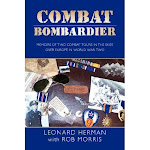
100th Bomb Group pilot Robert 'Rosie' Rosenthal flew over fifty missions over Europe in World War Two. Earlier this year, Rosenthal flew his final mission. Rosie was a great man in the Air Corps and a great asset to humanity in general.
I knew Rosie only slightly. When I tried to get his story in an interview, he demured, telling me he'd had way more than his share of publicity and directing me to another fine Jewish aviator, navigator Jerome Jacobson. I think Rosie got tired of and embarrassed by the attention he garnered, but the bottom line is that his story is so compelling that it is well worth repeating here.
I heard today from Mr. Mel Wacks, the director of the Jewish-American Hall of Fame. Mel wrote me to let me know that there is a new DVD about the life of Rosie Rosenthal. It is available from the Jewish-American Hall of Fame at the f0llowing address, for the nominal fee of fifteen dollars: Jewish-American hall of Fame, 5189 Jeffdale Ave., Woodland Hills, CA 91364.
I plan to order a copy this week, and I highly recommend it to all readers. A few of my friends saw it at the 100th BG reunion last month, and said it was outstanding.
What follows is a little background on Robert Rosenthal.
Robert "Rosie" Rosenthal (1917-2007)
The day after Pearl Harbor was attacked, Robert "Rosie" Rosenthal enlisted in the U.S. Army. In August 1943, he joined the 418th Squadron of the "Bloody" 100th Bombardment Group, stationed in England. Thirteen B-17s took off for a bombing mission over Munster … but only one returned - aptly named "Rosie's Riveters" - full of holes and flying on two engines. But in spite of the intercom being out, the oxygen system shot-up and a large ragged hole in the skin of the right wing, they had successfully dropped their bombs over the target.
In March, 1944 Rosie's Riveters completed its 25th mission, which completed their military service. But Rosie reenlisted, saying "I had to do what I could for as long as I was able." This was in spite of the fact that 15 missions was the average life of a bomber crew. Later, Rosenthal was made head of the 350th Squadron after the CO was shot down. Intelligence Officer Marvin Bowman found Rosenthal "one of the great figures of the Air Force; a shy, modest, and patriotic gentleman of truly amazing courage and achievement."
When Rosenthal's plane went down over Germany in September, he broke his arm and nose - but luckily was rescued by the Free French, to whom he had dropped supplies only a few weeks before. As soon as his arm had healed, Rosie returned to his original (418th) Squadron, and was chosen to lead a mission to Berlin on February 3, 1945. Even after a direct flak hit put an engine on fire, his blazing Fortress still managed to drop its bombs on the targeted Erkner factory before Rosenthal gave the signal to "Abandon ship." The rest of the crew parachuted and after B-17 had descended to about 1,000 feet, Rosenthal was the last to leave with the ground dangerously close … just before the ship exploded. Fortunately, he was found by Russians, who embraced him and took him to a hospital. This was his 52nd mission; there was to be just one more. Rosie flew his last mission after VE-Day … to free prisoners from concentration camps.
Rosenthal was one of the most decorated pilots in the Eighth Air Force. He received 16 decorations, including the Distinguished Service Cross for "extraordinary heroism in connection with military operations against the enemy," the Silver Star (with cluster) for "gallantry in action," the Distinguished Flying Cross (with cluster) for "heroism or extraordinary achievement during aerial flight," the Air Medal (with seven clusters), the Purple Heart (with cluster), plus the British Distinguished Flying Cross and the French Croix de Guerre.
Shortly after V-E Day, Rosenthal was back in Germany as an assistant to the United States Prosecutor at the Nuremberg Trials where, among other things, he interrogated Nazi leader Hermann Goering.
 Robert 'Rosie' Rosenthal is shown (above right) with aviation artist Gil Cohen with the oil original of Cohen's painting showing Rosie and his crew before a 1943 mission. Shown are (left to right): Waist Gunner S/Sgt. Loren Darling, Pilot 1st Lt. Robert Rosenthal, Radio Operator T/Sgt. Michael Boccuzzi, and Waist Gunner S/Sgt. James Mack.
Robert 'Rosie' Rosenthal is shown (above right) with aviation artist Gil Cohen with the oil original of Cohen's painting showing Rosie and his crew before a 1943 mission. Shown are (left to right): Waist Gunner S/Sgt. Loren Darling, Pilot 1st Lt. Robert Rosenthal, Radio Operator T/Sgt. Michael Boccuzzi, and Waist Gunner S/Sgt. James Mack. 
 E. Edward Herman, Left, and Robert Hilliard, Right, were two American privates who changed US policy and saved the lives of thousands of liberated concentration camp survivors after World War Two. Never heard of them? Shame on you. Time to find out.
E. Edward Herman, Left, and Robert Hilliard, Right, were two American privates who changed US policy and saved the lives of thousands of liberated concentration camp survivors after World War Two. Never heard of them? Shame on you. Time to find out.




